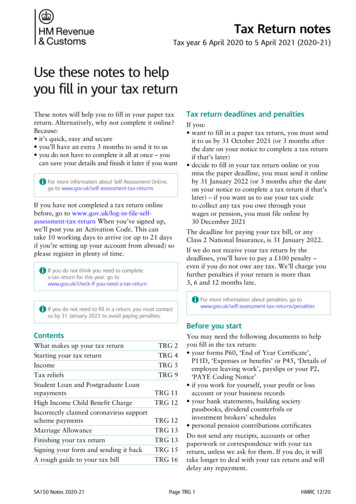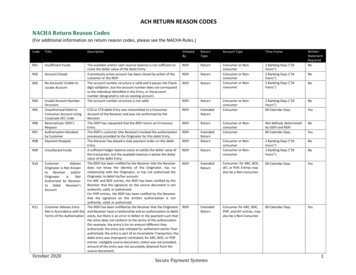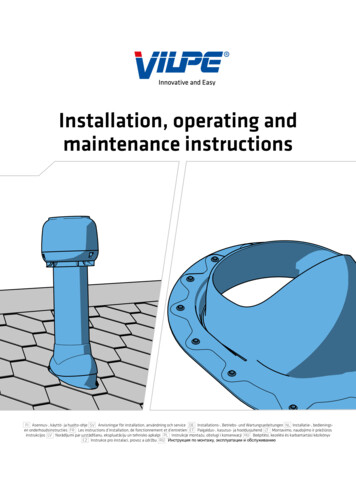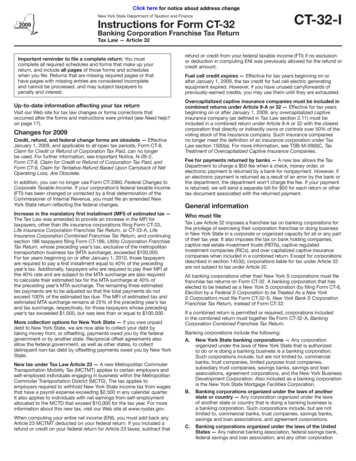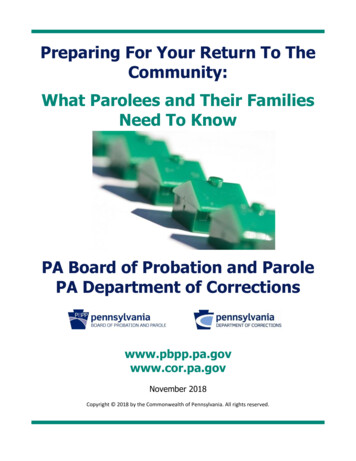
Transcription
Preparing For Your Return To TheCommunity:What Parolees and Their FamiliesNeed To KnowPA Board of Probation and ParolePA Department of Correctionswww.pbpp.pa.govwww.cor.pa.govNovember 2018Copyright 2018 by the Commonwealth of Pennsylvania. All rights reserved.
Preparing for Your Release:The Key to Starting OverAs a person who wants to leave your criminal past behind and rebuild your life, it is important that you realizethat returning home to your community is a process that begins from the day you enter prison.Begin preparing now. Put your time to good use.Highlights of the Parole ProcessIt is up to you to follow the correctional plan that has beendeveloped specifically to meet your needs. DOC will assign youa counselor who will monitor your progress in specificprograms or treatment.The parole process is best described as a seriesof steps for both the inmate and the board.It is up to you to take advantage of educational and vocationalprograms that will help you after you are released. Talk to yourcounselor about a GED or college diploma, vocational training,parenting classes, basic life skills courses, and how you can getinvolved in other positive programs or activities within the prison.Returning home successfully requires work, but it will berewarding.For you to be successful when you leave prison, it is importantthat you maintain connections to your family, and/or religious orcommunity organizations that are willing to assist parolees withreentry into the community. They will help you find solutions toproblems and help you to live a safe and healthy life.This network of support may help you find a place to live and ajob, two very important parts of the reentry process.Employment will enable you to support yourself and yourchildren, if any, and keep you on the track to a new lifestyle.When you are released, get in touch with those individuals andorganizations that you kept in contact with while in prison thatcan support your positive reentry into society. They can help youafter you return home.To help you adjust, get involved in local organizations. Find waysto give back to your community. Avoid individuals andorganizations that will encourage you to get re-involved incriminal activity.Your parole agent can help you and your family after you are released. Parole’s goal is to help you besuccessful. After you are released on parole, talk to your parole agent about your activities and get his or hersupport.Remember - there are many agencies, programs and people waiting to help you succeed!2
Preparing For Your Return To The Community:What Parolees and Their Families Need To KnowEach parole district offers a family support class for inmates who are nearing release from prison. These classeshelp family members understand the parole process and gain an understanding of conditions of parole. The goalis to help the family understand how they can help the parolee to be successful. For more information on theseclasses, please contact the district office where the parolee will be living after being released.A parolee’s successful return to the community is dependent on many factors. Planning and preparations beginwhile still in prison to ensure that housing, employment, benefits, treatment, programming and medical needsare met after the inmate leaves prison. The efforts that an inmate makes to prepare for release is viewed as thefoundation for the person to rebuild ties with the community and succeed on parole. Prior to paroleconsideration, an inmate must submit a home plan. This plan will be investigated to determine whether theproposed residence is appropriate for the parolee while on parole.Home PlanHome plan investigations are conducted in accordance with the Board’s dual mandate to protect the safety ofthe public and aid in the rehabilitation of the parolee. Home plans are investigated on a case by case basis. Theboard investigates a home plan to consider staff and public safety as well as victimissues and any other issues that may impact the successful reentry and parolecompletion of the parolee. These individual determinations depend upon a varietyof factors. Field agents investigate each proposed home site, keeping in mind theperson’s history and supervision needs, using discretion and sound judgment todetermine the appropriateness of the home plan.Ideally, an inmate should submit two (2) proposed home plans in the event that one of them is not determinedto be in the best interest of the parolee or the public. The home plan should provide a stable environment thatwill provide support and assistance to the parolee while searching for a job, attending counseling, seekingmedical care, striving for financial stability and locating transportation. The person will have conditions of parolethat must be followed and family members can help the parolee to follow them. This can be a stressful time thatcan cause a parolee to relapse – but a strong family support system, the help of clergy and friends and mentorscan help this not to happen.Although a potential home provider may agree to accept a parolee, the final decision still rests with the parolesupervision staff based on the individual circumstances of the case and the past experience in supervisingcertain types of individuals.The institutional parole staff will assist the inmate with the home plan process, but they are not responsible forsecuring a home plan for an inmate.In deciding if a residence is suitable, a parole agent or parole investigator will obtain the followinginformation and any other information deemed necessary regarding the proposed home: Name and relationship to inmate of personoffering the home Name and phone number of personinterviewed Location of home, including the type ofneighborhood Proximity to employment and availability ofpublic transportation3
List of the occupants and their relationshipto parolee, age, sources of income, criminalrecords and feelings toward parolee Potential sources of conflict Responsibilities of the parolee: rent, room,and rules Whether or not weapons are present in thehome Determine if a telephone is available Any history of domestic violence withmembers of the household Confirm that the home provider is aware ofthe person’s criminal recordThe investigating parole agent must provide potential home providers with the following information: Agent’s role, responsibilities and contact information Parole conditions and their impact on those residing in the home (see general parole conditions) Moving/travel restrictions: the parolee cannot move or leave the district without permission from theparole agent Board’s weapons policy - No weapons are allowed in the home The agent’s ability to conduct searches and make unannounced visits – without a warrantIf Granted Parole.If granted parole, the board may parole the inmate to an approved home plan (private residence), a Departmentof Corrections (DOC)-operated Community Corrections Center (CCC), or a privately operated facility (CCF) thatoperates under contract to the DOC.If granted parole to a CCC or CCF, the DOC will determine a bed date for the inmate, based on where he plans tolive and any special treatment needs he requires. DOC tries to place individuals in CCCs as close as possible tothe parolee’s proposed home area or the committing county.The parolee’s family members, friends, or previous employers can assist the individual in applying foremployment while the inmate is still incarcerated. Institutional counselors and institutional parole agents willprovide guidance as appropriate – they do not have lists of employers willing to hire parolees.Home plans are investigated by the agent who will supervise the parolee after the inmate receives a BoardAction, which is the official board decision, to grant parole.There are a number of restrictions imposed on the home provider, and not everybody that offers an inmate ahome at first will be able to keep that offer after they learn all the rules.If the provider is still willing to provide a parolee with a residence, they also will have to provide a copy of proofof ownership of the property or verifiable contact information for the landlord to the investigating agent.Approved home plans are valid for 150 days from the date of approval.
If an inmate’s home plan expires, or if the situation inside the home changes, the parole agent will have torecheck the inmate’s plan prior to his releaseIndividuals with sex offense histories, violent criminal historiesand medical concerns represent cases that may4experience delays that do not fit the normal process and timing. These hard to place individuals need to workclosely with their families and institutional parole agents to try to develop viable reentry plans.It is in the inmate’s interest to remain aware of his home plan status and coordinate this information with hiscase manager at the prison. As a guideline, parole staff has approximately 30 days to approve or deny a newhome plan proposal after the field agent receives it.If a person hopes to live in another state upon parole release, he should begin the planning process as early aspossible. Interstate applications require payment of a 100 fee upon application.TimelineIf the inmate is approaching his minimum sentence date: Approximately eight months before the minimum sentence date, the inmate should be given aStatement of Residence and a Statement of Employment form. The inmate should send the Statement of Residence form to the person(s) offering him a residence andthe Statement of Employment form to potential employers. After the inmate has received the Statement of Residence signed by the potential home provider or theStatement of Employment signed by the potential employer, it is the inmate’s responsibility to makesure the forms are given to his institutional parole agent. The investigation of a home plan is initiated shortly after an inmate has been granted parole, which isoften before the minimum sentence date.If the inmate has previously been denied parole: The inmate’s most recent Board Action will establish a proposed month for a parole review. The inmate’s institutional parole agent will instruct the person on how to submit a proposed home planthree months prior to the scheduled parole interview month.If the inmate is in a CCC or halfway house: When the inmate thinks he has found a valid home plan proposal, he contacts his DOC case manager orparole agent at the facility and provides him with this information. After the inmate receives these materials back from the potential home provider, the materials are tobe given to the inmate’s DOC case manager. The case manager will forward these materials toinstitutional parole staff for individual investigation by a field agent.How is a home plan investigated?The assigned parole agent will visit with the proposed home provider, in person, at the residence being offered.
The agent will give the home provider a copy of this brochure: Preparing For Your Return To The Community:What Parolees and Their Families Need to Know.The agent will review the Home Provider Agreement Letter with the proposed home provider and have thehome provider sign the form.It is very important for the home provider to be available5 to meet with the agent.Unanswered phone calls and a refusal to respond to business cards left in the door in a timely manner willresult in a home plan rejection.The agent will obtain input from local police, neighbors and other community members, and he or she willdetermine the availability of community resources to assist with reentry.The following information will be recorded on a checklist by the agent: A business card was given to the homeprovider. The general conditions of parole and possiblespecial conditions for the parolee werereviewed with the home provider. The offense which the inmate is currentlyconvicted of will be disclosed to the proposedhome provider. Information disclosed is limitedto public information. The procedure for the parolee changing hisresidence was explained. The proposed home provider restrictionsregarding possessing firearms and otherweapons and implications for home suitabilitywere explained. The agency’s right to conduct warrantlesssearches of the approved residence wasexplained.What Parolees and Their Families Need toKnow. Staff has determined the availability of atelephone in the residence and noted in thesummary any lack of telephone access due tospecial features or Internet access. The possibility of electronic monitoringrestrictions was reviewed with the homeprovider. Staff has listed all residents, their age,relationship to the parolee, any source ofincome and any criminal record, for each. Staff has toured the entire proposed residenceand determined: Any circumstances that would place theparole supervision staff in danger such asdangerous dogs. The physical condition as far as habitability. The home provider was informed of thelocation and hours of the field parole office. Any sources of conflict that may precludeapproving the residence. The home provider was informed that staff mayconduct visits to the residence outside of thenormal business hours. The number of exits in the home. The home plan provider was informed of theboard’s policy statement on domestic violenceand was given a copy of the board’s brochure:Preparing For Your Return To The Community: The responsibilities the home provider expectsfrom the parolee such as paying for rent, room,board, and any rules to which the person mustcomply.6
Whether the home provider is renting or leasingthe residence. If so, staff must obtain thelandlord’s name, telephone number, andaddress and ask to see the lease. If the plan is being submitted for investigationwithout employment, there must be verificationof the availability of other forms of financialsupport such as family support, Social Securityor disability benefits.Factors That Could Result in Home Plan Rejections Section 8 or other public housing sometimes does not permit individual who were not previously on thelease in their housing units.Proposed residence has weapons or circumstances exist that would place the parole supervision staff indanger.The physical condition of the home is unsafe or unfit or inadequate sleeping arrangements.Conditions existing within the proposed home that would present the likelihood of the paroleecommitting similar offenses or technical parole violations.The proposed home provider is not currently cooperative with parole supervision staff.The presence in the home of other parolees or those on probation for serious offenses which mayincrease the parolee’s risk of re-offending.Conditions leading to the offense are not re-established, such as when the victim or victim’s familyresides in the household or in close proximity, domestic violence issues, and sex offender issues.The proposed home provider is unwilling to agree to conditions contained in the home agreement orhas inadequate household accommodations.Inmate Obligations That Must Be Met Before ReleaseMost parole interviews occur four months prior to the inmate’s minimum sentence date, but the person cannotbe released before the minimum sentence date. Many things must happen prior to release. On average aninmate is released within 4-6 weeks from the time they are notified of the decision to parole if their minimumdate has passed.After parole is granted, but before an inmate may be released to either a CCC or a home plan, the laws ofPennsylvania require completion of various actions.Negative Pre-Release Drug Screening TestInmates with drug-related convictions or who have tested positive for drugs while in prison must test negativefor illegal drugs. Test results are valid for 45 days.Payment of Fees for VictimsPennsylvania law requires inmates to pay a fee to a fund that provides certain services to victims of crime.Submission of DNA SampleAll inmates currently incarcerated for certain misdemeanors or any felony offenses are required to provide aDNA sample. Inmates convicted of an offense requiring registration must register their home address, intendedplace of employment, and/or enrollment as a student with the Pennsylvania State Police.Participation in Victim Impact Education ProgramIf a person is convicted of a crime of violence, as defined by 42 Pa.C.S. § 9714(g), the inmate must participate ina victim impact education program offered by the DOC.
General Conditions of Parole Must be under the supervision of a district office or sub office and not leave that district without priorwritten permission of the supervising parole agent.7 Must obtain prior written permission of the supervising parole agent in order to change residence. Must maintain regular contact with the parole agent by:1. Reporting regularly as instructed and following written instructions of agent.2. Notifying agent within 72 hours of an arrest, receipt of a summons, citation or offenses punishableby imprisonment.3. Notifying agent within 72 hours of a change in status including employment, on-the-job training andeducation. Must comply with state, county, local and federal criminal laws, regulations, ordinances, the vehiclecode and the liquor code. Must abstain from the unlawful possession or sale of narcotics/drugs and from the use of controlledsubstances without a valid prescription. Must refrain from owning/possessing firearms or other weapons. This includes all firearms whetherfunctional or not and includes facsimiles, muzzle loaders, archery equipment, etc. Must refrain from assaultive behavior, including physical and verbal assault. Must make continuing payments on fines, costs and restitution imposed by the sentencing court.
Preparing for Your Release: The Key to Starting Over As a person who wants to leave your criminal past behind and rebuild your life, it is important that you realize that returning home to your community is a process that begins from the day you enter prison. Begin preparing



